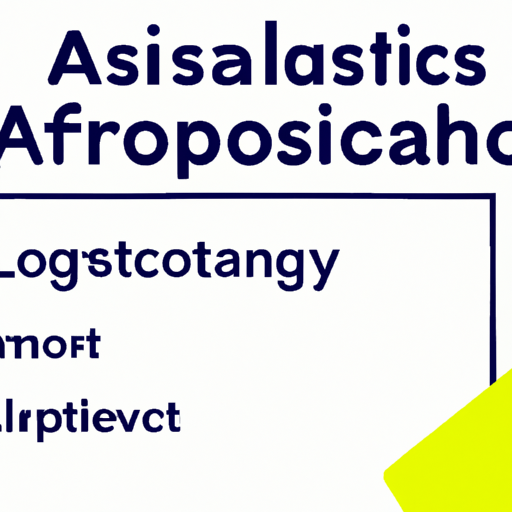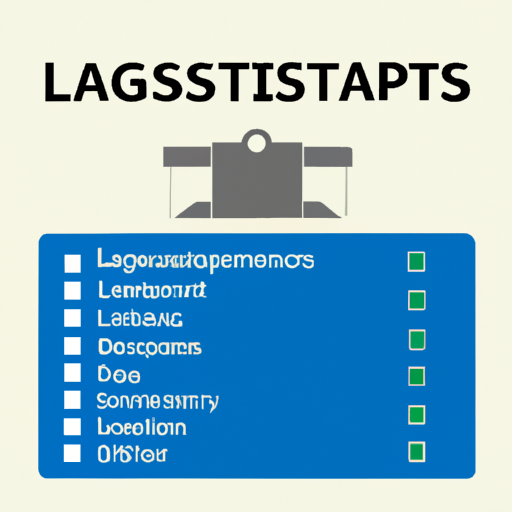Logistics operations lie at the heart of any successful business, ensuring the smooth flow of goods from production to distribution. In this dynamic professional landscape, the role of a logistics assistant has become increasingly vital. A logistics assistant acts as a crucial link within the supply chain, supporting the efficient planning, coordinating, and monitoring of all logistical activities. This article aims to provide an in-depth exploration of the logistics assistant job description, outlining the key responsibilities, qualifications, and skills required for individuals seeking to embark on this challenging yet rewarding career path.
Table of Contents
- Responsibilities of a Logistics Assistant
- Key Skills and Qualifications for a Logistics Assistant
- Daily Duties and Tasks of a Logistics Assistant
- Importance of Attention to Detail in a Logistics Assistant Role
- Effective Communication Strategies for a Logistics Assistant
- Optimizing Efficiency in Logistics Operations with a Logistics Assistant
- Maintaining Accuracy and Timeliness in Inventory Management as a Logistics Assistant
- Collaborating with Team Members as a Logistics Assistant
- To Wrap It Up

Responsibilities of a Logistics Assistant
A logistics assistant plays a crucial role in the efficient operations of a company’s supply chain. They are responsible for supporting the logistics team in various tasks and ensuring smooth coordination of logistics activities. Here are some key :
- Assisting in the management of inventory levels by monitoring stock levels and ensuring timely replenishment.
- Coordinating with suppliers and vendors to ensure timely delivery of goods and materials.
- Preparing and maintaining documentation related to logistics activities, such as shipping records, purchase orders, and invoices.
- Assisting in the preparation of shipping schedules and ensuring compliance with relevant regulations and requirements.
- Coordinating transportation and logistics services, including arranging shipments and tracking delivery progress.
Apart from these core responsibilities, a logistics assistant may also be involved in conducting data analysis to identify areas for improvement in logistics processes. They may assist in cost control and optimization initiatives, analyzing transportation routes and suggesting more efficient options. Additionally, a logistics assistant may be responsible for communicating with internal stakeholders, such as other departments or senior management, to provide updates on logistics activities and address any concerns or queries.

Key Skills and Qualifications for a Logistics Assistant
1. Organizational skills: As a logistics assistant, it is crucial to have exceptional organizational skills. You will be responsible for coordinating and tracking various shipments, ensuring they are delivered on time and in perfect condition. Strong attention to detail and the ability to multitask will help you maintain accurate records, manage inventory, and resolve any logistical issues efficiently.
2. Communication skills: Effective communication is essential in the logistics field. You will be working with suppliers, customers, and transportation providers regularly, so having excellent verbal and written communication skills is paramount. The ability to articulate information clearly, negotiate contracts, and resolve disputes diplomatically will contribute to the smooth flow of operations, facilitating successful collaboration among different stakeholders.

Daily Duties and Tasks of a Logistics Assistant
A logistics assistant plays a crucial role in ensuring the smooth operations of a company’s supply chain. Their daily duties and tasks involve a wide range of responsibilities that contribute to the overall efficiency and effectiveness of the logistics department. Here are some of the key duties and tasks that a logistics assistant is typically responsible for:
- Collaborating with other departments to coordinate and schedule shipments, ensuring on-time delivery.
- Managing inventory levels and conducting regular stock checks to monitor supply and demand.
- Preparing shipping documentation, including bills of lading and customs forms, while ensuring accuracy and compliance with regulations.
- Tracking and tracing shipments to provide real-time updates to stakeholders and proactively addressing any issues or delays.
- Liaising with vendors and suppliers to negotiate rates, terms, and conditions for transportation services and materials.
- Assisting in the implementation and maintenance of logistics software systems to optimize processes and improve efficiency.
- Monitoring and analyzing logistics performance metrics to identify areas for improvement and implementing strategic initiatives accordingly.
Overall, a logistics assistant must possess strong organizational skills, attention to detail, and excellent communication abilities. They should be proficient in using logistics software and have a solid understanding of supply chain management principles. By successfully carrying out their daily duties and tasks, logistics assistants contribute to the seamless coordination of the movement of goods and materials, ultimately enhancing the overall productivity of the organization.
Importance of Attention to Detail in a Logistics Assistant Role
When it comes to a logistics assistant role, attention to detail is of utmost importance. This skill plays a crucial role in ensuring that shipments are handled efficiently and accurately. In the logistics industry, even the smallest oversight can lead to significant delays, costly mistakes, and dissatisfied customers.
Having a keen eye for detail allows a logistics assistant to effectively manage inventory, track shipments, and ensure orders are fulfilled accurately. With the fast-paced nature of the logistics industry, the ability to spot inconsistencies, double-check information, and follow processes meticulously can make all the difference. Furthermore, attention to detail not only ensures smooth operations but also helps mitigate risks, prevent errors, and maintain the reputation of the company. In a role where precision is key, a logistics assistant who prioritizes attention to detail becomes an invaluable asset to any organization.
Effective Communication Strategies for a Logistics Assistant
Communication plays a crucial role in the success of a logistics assistant, as it ensures that operations run smoothly and information is effectively shared among team members. To excel in this role, it is important to employ several communication strategies that enhance collaboration and efficiency.
1. Active Listening: As a logistics assistant, it is essential to be an attentive listener. Actively listening to instructions, feedback, and inquiries from colleagues and superiors allows for a better understanding of tasks and expectations. Use non-verbal cues, such as eye contact and nodding, to demonstrate engagement and ensure that you capture all relevant information.
2. Clear and Concise Writing: Written communication is just as vital as verbal communication in the logistics field. The ability to convey information clearly and concisely ensures that messages are easily understood and actioned upon. When writing emails, reports, or memos, take the time to organize your thoughts, use proper grammar and punctuation, and be mindful of tone. This promotes clarity, reduces the risk of misinterpretation, and portrays professionalism in your communication style.
3. Utilize Technology: In today’s digital age, leveraging technology can significantly enhance communication in logistics. Familiarize yourself with collaborative platforms, project management tools, and other software applications that enable efficient information-sharing and real-time updates. Embrace video conference calls, instant messaging apps, and email automation to streamline communication processes and ensure constant connectivity with team members, even when physically distant.
4. Scheduling and Prioritization: Effective communication involves managing time and tasks efficiently. Create and maintain a detailed calendar to stay organized and keep track of deadlines, meetings, and daily responsibilities. Prioritize tasks, focusing on those that require immediate attention or coordination with others. By setting clear timelines and communicating expectations to colleagues, you can ensure smoother workflow and minimize potential bottlenecks.
In conclusion, mastering effective communication strategies as a logistics assistant is essential for success in this role. By practicing active listening, honing writing skills, utilizing technology, and implementing efficient scheduling and prioritization methods, you can enhance collaboration, productivity, and overall performance within the logistics team.
Optimizing Efficiency in Logistics Operations with a Logistics Assistant
A logistics assistant plays a crucial role in optimizing efficiency in logistics operations. This integral position requires an individual who is highly organized, detail-oriented, and possesses strong communication skills. As a logistics assistant, some of the key responsibilities include:
1. Coordinating shipments: One of the primary tasks of a logistics assistant is to coordinate the transportation of goods to ensure timely delivery. This involves collaborating with carriers, warehouses, and suppliers to schedule pickups and deliveries. By efficiently managing the logistics of shipments, a logistics assistant helps to minimize delays and increase customer satisfaction.
2. Tracking and monitoring: A logistics assistant is responsible for tracking and monitoring the movement of goods throughout the supply chain. This involves using transportation management systems and other tracking tools to ensure shipments are on schedule. By closely monitoring shipments, a logistics assistant can identify any potential issues and take proactive measures to resolve them, such as rerouting shipments or adjusting delivery schedules.
Additionally, a logistics assistant may be responsible for maintaining accurate records, preparing reports, and assisting with inventory management. This role is well-suited for individuals who thrive in a fast-paced environment and have a keen eye for detail. Join our team as a logistics assistant and be part of our mission to optimize efficiency in logistics operations!
Maintaining Accuracy and Timeliness in Inventory Management as a Logistics Assistant
As a Logistics Assistant, one of your key responsibilities will be maintaining accuracy and timeliness in inventory management. This crucial aspect of the role requires attention to detail and organizational skills to ensure that the correct inventory levels are maintained at all times.
In order to achieve this, you will be required to regularly monitor inventory levels and update the database accordingly. This includes receiving and inspecting incoming shipments, verifying the accuracy of inventory records, and promptly addressing any discrepancies. Additionally, you will need to coordinate with other departments to ensure that inventory requests are processed in a timely manner, and make sure that all necessary documentation and paperwork is accurate and up to date.
Attention to detail is key in this role, as any inaccuracies in inventory management can have a significant impact on the overall efficiency of the logistics process. By maintaining accurate and up-to-date inventory records, you will contribute to a smoother workflow and ensure that the company has the right products and materials available when needed. With your keen eye for detail and commitment to timeliness, you will play a vital role in optimizing the supply chain and supporting the successful operation of the logistics department.
Collaborating with Team Members as a Logistics Assistant
As a logistics assistant, working effectively with your team members is essential for the smooth operation of the logistics department. Collaboration not only improves efficiency but also fosters a positive work environment. Here are some key aspects to consider when collaborating with your team members:
- Communication: Clear and prompt communication is crucial in a logistics assistant role. Regularly update team members on important information, such as changes in schedules or delivery updates. Actively listen to their input and address any concerns they may have. Effective communication ensures that everyone is on the same page and promotes a cohesive team dynamic.
- Task delegation: Collaborating with team members involves delegating tasks efficiently. Assign responsibilities based on each person’s strengths and skills. This not only ensures that tasks are completed effectively but also allows team members to develop new skills and feel valued within the team. Regularly review progress and provide constructive feedback to encourage growth and improvement.
- Support and teamwork: Logistics can be a demanding field, requiring a high level of coordination and adaptability. Offer support to your team members by providing resources, guidance, and assistance when needed. Encourage a culture of teamwork, where everyone is willing to assist each other and work towards common goals. A supportive and collaborative atmosphere boosts morale and encourages a sense of unity within the team.
By prioritizing effective communication, task delegation, and supporting your team members, you can enhance collaboration as a logistics assistant. Remember that a strong and collaborative team is key to achieving success in the logistics industry.
To Wrap It Up
In conclusion, a logistics assistant plays a fundamental role in ensuring the smooth and efficient operation of any organization’s supply chain. With their keen attention to detail, strong organizational skills, and ability to work collaboratively with various stakeholders, logistics assistants are key contributors to the success of any logistical operation.
From managing inventory, coordinating shipments, and tracking orders to handling documentation and resolving any logistical issues that may arise, the responsibilities of a logistics assistant are diverse and demanding. This role requires someone who thrives in a fast-paced environment, possesses excellent problem-solving abilities, and is adept at multitasking.
While the specific duties may vary depending on the industry and company, one thing remains constant: a logistics assistant is an invaluable asset in ensuring the timely delivery of goods and services while minimizing costs and maximizing efficiency.
If you are seeking a career in logistics and have a passion for coordinating complex logistical operations, then a logistics assistant role could be the perfect fit for you. With countless opportunities for growth and development within this field, a logistics assistant job provides an excellent starting point for building a successful career in the dynamic world of supply chain management.
Whether you are an entry-level professional looking to kickstart your career or an experienced logistician seeking new challenges, the role of a logistics assistant offers a rewarding and fulfilling career path. By embracing the diverse set of responsibilities and demonstrating a commitment to excellence, you can make a meaningful impact on the overall efficiency and profitability of an organization.
So, if you are ready to embark on a journey that will test your organizational skills, problem-solving abilities, and ability to work under pressure, consider pursuing a career as a logistics assistant. With a job market that continues to grow and evolve, the opportunities in this field are endless. Don’t miss out on the chance to be at the forefront of an industry that shapes the global economy.
